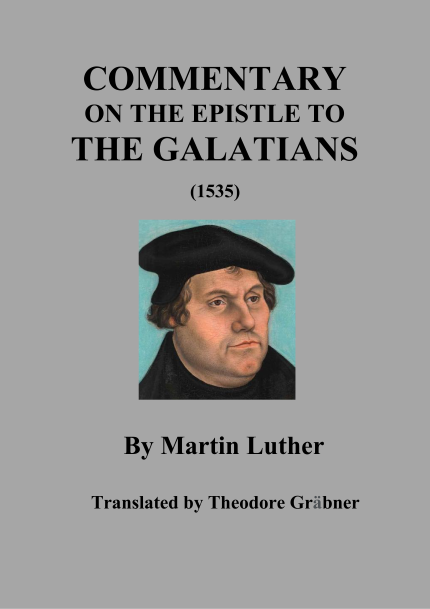Martin Luther’s Commentary on Galatians (1535) is one of his most influential works, offering a passionate defense of justification by faith. Written at the height of the Reformation, this commentary reflects Luther’s deep theological convictions and his unshakable belief that salvation comes through faith in Christ alone.

Commentary on the Epistle to The Galatians. (1535)
By Dr. Martin Luther.
Translated by Theodor Graebner.
Martin Luther’s Commentary on Galatians (1535) powerfully defends justification by faith, Christian freedom, and the gospel’s triumph over legalism.
Key Themes in Luther’s Commentary
Justification by Faith Alone
At the heart of Luther’s exposition is the doctrine that a person is justified not by works, but solely by faith in Christ. He engages directly with Paul’s letter, particularly chapters 2 and 3, where the apostle refutes reliance on the law for salvation.
A Challenge to Legalism
Luther’s writing is passionate and polemical, confronting what he saw as legalistic distortions of the gospel. He directly challenges the Catholic Church’s teaching that human effort plays a role in justification, arguing instead that grace is entirely a gift from God.
Christian Freedom
One of Luther’s central concerns in Galatians is the believer’s freedom in Christ. He insists that faith liberates Christians from the burden of the law, emphasizing that salvation does not depend on human merit but on Christ’s finished work.
Theology of the Cross
Echoing his broader theological vision, Luther highlights how God’s power is revealed in weakness. He contrasts human efforts with the all-sufficient grace of God, showing how Christ’s suffering and death bring true righteousness.
Practical Faith
Though deeply theological, Luther’s commentary is also practical. He urges believers to live in the confidence of their salvation, free from guilt, and to serve others in love.
A Lasting Impact
Luther’s Commentary on Galatians became a foundational text of the Reformation, shaping Protestant thought for centuries. His interpretation of Paul’s message continues to inspire those seeking a deeper understanding of grace, faith, and Christian freedom.
Overview of the Book of Galatians
The Epistle to the Galatians, written by the Apostle Paul, is a passionate defense of the gospel of grace. Paul addresses the churches in Galatia, warning them against false teachers who claim that obedience to the Mosaic Law is necessary for salvation. He emphasizes that righteousness comes through faith in Christ alone, not by works of the law.
Key themes include:
Justification by Faith – Paul insists that believers are justified by faith, not by observing the law (Galatians 2:16).
Freedom in Christ – He teaches that Christ has set believers free from the bondage of the law (Galatians 5:1).
Life by the Spirit – Instead of relying on the law, Christians are to live by the Spirit, producing the fruit of love, joy, and peace (Galatians 5:22-23).
Galatians is a bible book that give better understanding of Christian freedom and the role of grace in salvation, making it central to Martin Luther’s Reformation theology.
The Translator Theodor Graebner.
The preparation of this edition of Luther’s Commentary on Galatians was first suggested to me by Mr. P. J. Zondervan, of the firm of publishers, in March, 1937. The consultation had the twofold merit of definiteness and brevity.
“Luther is still the greatest name in Protestantism. We want you to help us publish some leading work of Luther’s for the general American market. Will you do it?”
“I will, on one condition.”
“And what is that?”
“The condition is that I will be permitted to make Luther talk American, ‘streamline’ him, so to speak—because you will never get people, whether in or outside the Lutheran Church, actually to read Luther unless we make him talk as he would talk today to Americans.”
I illustrated the point by reading to Mr. Zondervan a few sentences from an English translation lately reprinted by an American publisher, of one of Luther’s outstanding reformatory essays. The demonstration seemed to prove convincing for it was agreed that one may as well offer Luther in the original German or Latin as expect the American church-member to read any translations that would adhere to Luther’s German or Latin constructions and employ the Mid- Victorian type of English characteristic of the translations now on the market.
“And what book would be your choice?”
“There is one book that Luther himself likes better than any other. Let us begin with that: his Commentary on Galatians…”
The importance of this Commentary on Galatians for the history of Protestantism is very great. It presents like no other of Luther’s writings the central thought of Christianity, the justification of the sinner for the sake of Christ’s merits alone.
May the reader accept with indulgence where in this translation we have gone too far in modernizing Luther’s expression—making him “talk American.”
THEODORE GRAEBNER
St. Louis, Missouri
Looking for a Hardcover or Paperback?
For those who want to have a hardcover or a paperback of this book, I want to suggest you to look here (paperback) or here (hardcover).
Some of his other works: